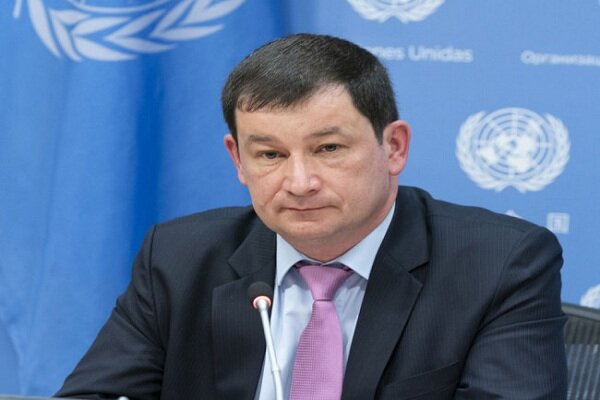U.S. economic hegemony is waning: Russian diplomat

The withdrawal of U.S. forces from Afghanistan has triggered a lot of speculation about the decline of America. It was a big political catastrophe that reminds the world of the U.S. exit from Vietnam.
But before its military failure in Afghanistan, America ruined its reputation via unilateral policies to push other countries to align with Washington, especially when President Donald Trump weaponized sanctions against Iran, Russia and China.
That is why some politicians talk about the U.S. decline.
”My colleagues in Vienna not aware of all the details of possible agreement” “U.S. economic hegemony is waning in a natural way, our task is to strengthen domestic economies and cooperation of like-minded countries,” Dmitry Polanski, the first deputy permanent representative of Russia to the UN, tells the Tehran Times.
U.S. “sanction diplomacy” coupled with its use of the dollar as a weapon to pressure others, some countries are pushing the international community to take steps to curb American hegemony.
“We interact in particular in the UN and try to mobilize support for the UN Charter,” Polanski says when asked about multilateral efforts to respond to Washington’s sanctions on Russia and other countries.
But it could be safe to say that it was Iran that faced the harshest sanction campaign when Trump decided to abandon the Iran nuclear deal, officially known as the Joint Comprehensive Plan of Action, in May 2018. Trump reimposed economic sanctions on Iran lifted under the JCPOA and added new ones to force Tehran to give up on U.S. conditions.
However, the “maximum pressure” policy failed to change Iran’s nuclear policies. Now the Biden administration tries to rejoin the JCPOA through nuclear negotiations brokered by the EU in Vienna.
Despite some pessimistic views about reaching an agreement in the short run, Polanski expects the talks to continue in Vienna. “Not forgetting that U.S. withdrawal from the JCPOA triggered the current crisis. We believe that not only Washington but also Tehran should return to compliance with the deal.”
The U.S. wants a much bigger bargain which covers Iran's ballistic missiles and what they call Iran’s “regional ambitions.”Russia’s Foreign Ministry has reacted to press reports that Iran has allegedly accelerated its production of highly enriched uranium, underlining that this was because of the lack of progress on the restoration of the JCPOA.
The Russian reaction came a week after Reuters reported that Iran has accelerated its enrichment of uranium.
Citing a report by the International Atomic Energy Agency, Reuters said that “Iran increased the purity to which it is refining uranium to 60% from 20% in April in response to an explosion and power cut at its Natanz site that damaged output at the main underground enrichment plant there.”
“This yet another JCPOA deviation is mostly due to the lack of practical results of Nuclear Deal restoration, while unilateral U.S. sanctions against Iran & other cooperating countries remain intact,” the Russian Foreign Ministry said, according to a tweet by the Russian diplomatic mission in Vienna.
It added, “However, we’re more concerned that this takes us further away from the initial goal, while the task to create conditions for sustainable implementation of comprehensive agreements gets more elusive.”
On U.S. main preconditions to rejoin the nuclear deal and if America’s terms are viable or not, especially when they talk about developing the pact to include Iran’s missile program, the top Russian diplomat says, “As far as I know my colleagues in Vienna are not aware of all the details of possible agreement. It’s being facilitated through EU good offices, not Russian.”
Despite U.S. emphasis on its seriousness in nuclear talks, the Russian diplomat says there is no difference between the Biden administration and his predecessor. Biden has not still lifted the sanctions imposed on Iran by Trump. That is what Russian officials complain about.
“We condemn this policy. And so far we don’t see any difference between the Trump and Biden administrations in this regard,” Polanski concludes.
